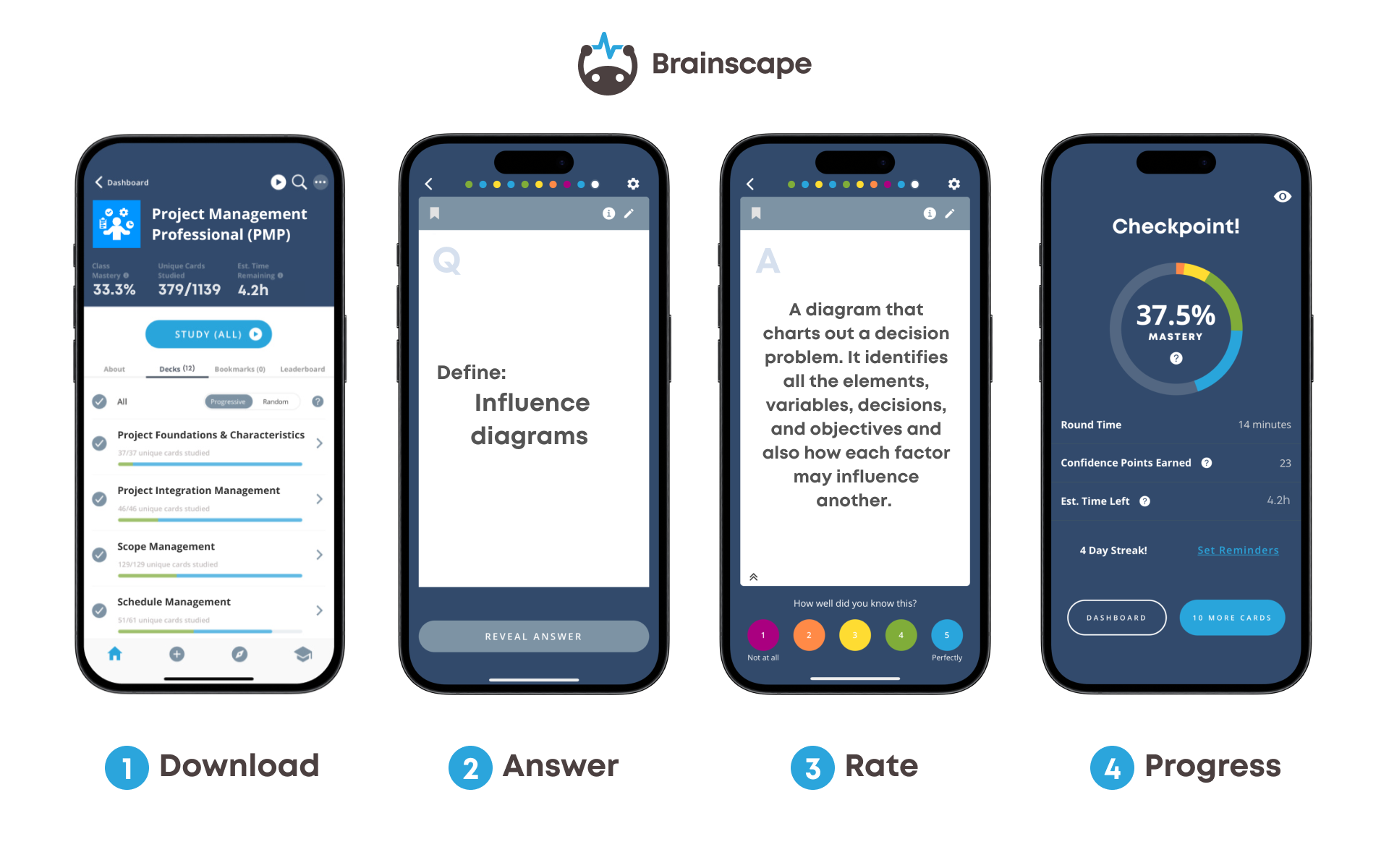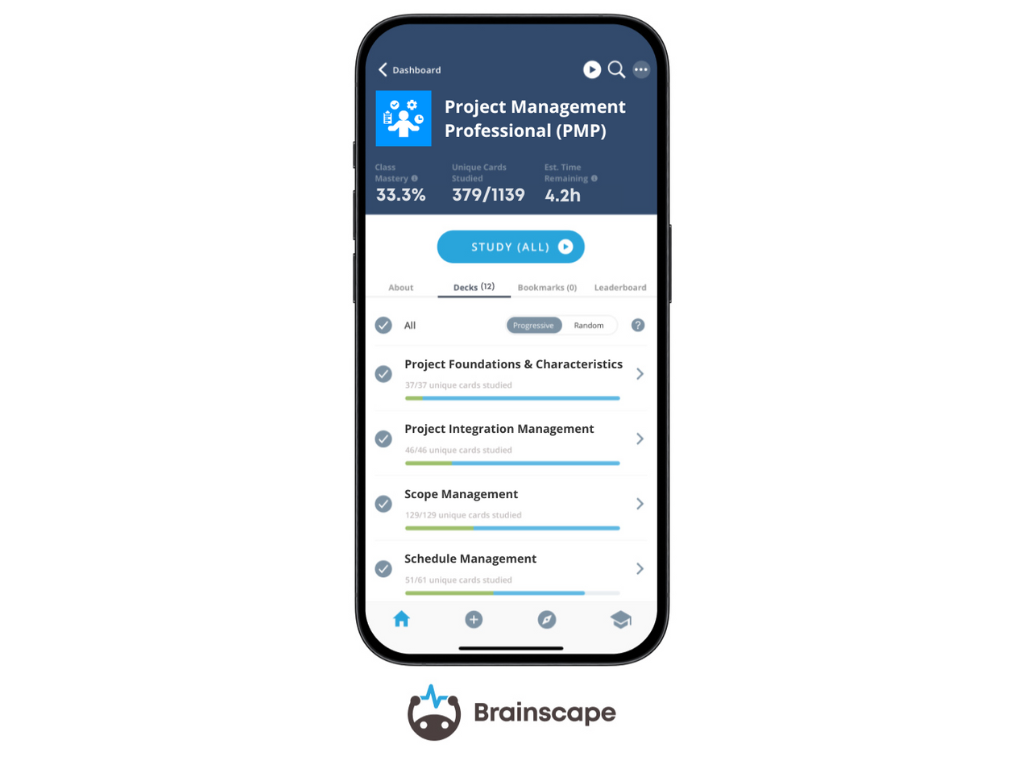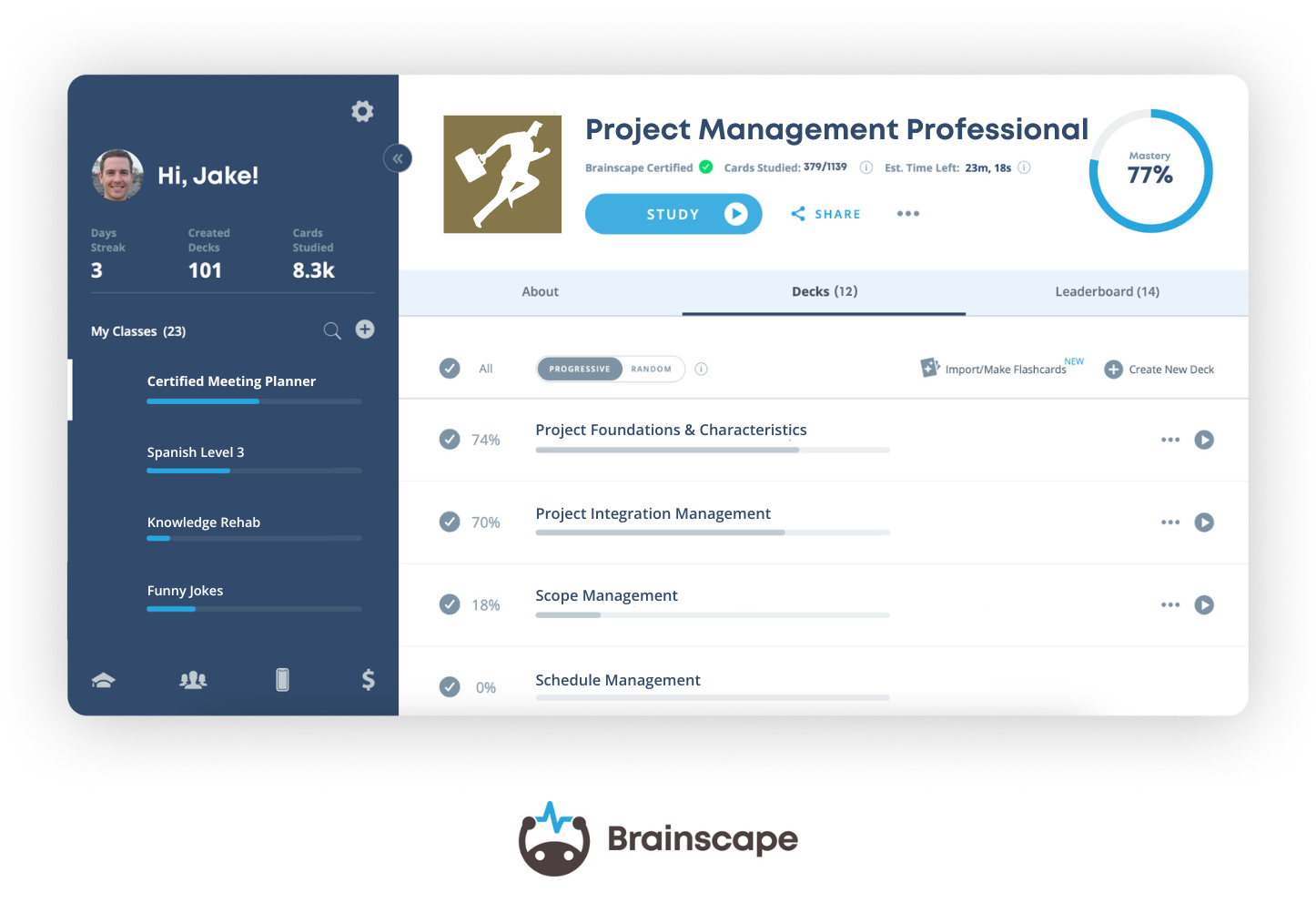If you're considering becoming a certified project manager, there's a good chance you've asked the question: How hard is the PMP® exam?
Short answer: it's no walk in the park.
Longer answer: the PMP exam is a rigorous, comprehensive assessment of your ability to apply project management principles to real-world situations. But with 2 to 3 months of the right exam preparation, the PMP is absolutely passable. Sixty to 70% of exam-takers pass the PMP the first time around, with many of the remainder returning to finish what they started later on.
This PMP® study guide explains just how hard the PMP exam is, what makes it so challenging, and, more importantly, how to dominate it like the confident, well-organized professional you are! First, however, let’s introduce a powerful study tool to help you ingrain and retain the enormous amount of content you need to learn to confidently take on the PMP exam...
Adaptive Digital Flashcards for the PMP Exam

Flashcards that incorporate learning principles like spaced repetition are the most efficient way to learn and retain a large volume of content. And one of the best smart flashcard apps out there is Brainscape, which has partnered with Instructing.com—a premier provider of project management training—to develop a comprehensive set of PMP Exam flashcards.

These cards cover all the core terminology in the PMP Exam Content Outline (ECO), as well as widely recognized PMP study resources like the PMBOK Guide, saving you a ton of hard work.
Additionally, an enormous benefit to many PMP candidates, who are already working full time, you can study these flashcards anytime, anywhere, even offline if you download decks beforehand. Just tap the study button and you’ll instantly be transported into the heart of your studies, right where you left off.
Let's now get back to the question...
Why Is the PMP Exam Considered Difficult?
Broad Coverage of Project Management Principles and Topics
The PMP exam tests your knowledge across the entire project management spectrum, from scope and scheduling to procurement, risk, and stakeholder engagement. To pass this exam, you’re expected to demonstrate mastery of the full project lifecycle and a wide range of methodologies. It’s the Swiss Army knife of project management certifications. (Brainscape’s PMP flashcards cover the full suite of terminology and definitions you need to know to support this learning.)
Conceptual and Situational Questions
Another reason why the PMP exam is hard is that it leans heavily on situational questions that test your ability to navigate tricky real-world scenarios. You'll encounter:
- Multiple Choice
- Multiple Response
- Matching
- Hotspot
- Fill-in-the-Blank
- Situational/Scenario-Based Questions
All of this raises the difficulty level of the project manager exam—especially if you're lacking in practical experience—but one you can conquer with the right strategy.
Effective Time Management Challenges
180 Questions in 230 minutes means you’ve got a little over one minute per question. With several complex project scenarios to dissect, that’s not much. You’ll need to use your time efficiently, which contributes to the exam difficulty.
Exam Anxiety and Stress Management
For many, just knowing how important this certification is can cause nerves. Add long testing hours and high expectations. Boom. Anxiety city. Preparing your exam mindset and developing some calming strategies are just as critical as your project management knowledge.
Overwhelm: Candidates are Already Usually Working
In addition to all of the aforementioned reasons why the PMP exam is difficult, you've got the fact that most exam takers are already full-time working professionals! While this hands-on experience may benefit your theoretical knowledge and practical application skills, it doesn't leave you with a whole lot of time in the day to study. (We’ll address how you can overcome that shortly.)
What Are the Most Common Reasons for PMP Exam Failure?
Lack of Practical Project Management Experience
The PMP exam expects you to know the material and have a strong understanding of project management concepts. Without that foundation, the scenarios can feel abstract and confusing.
Inadequate Understanding of the PMI Mindset
Best-selling author, project management trainer, and Director of Education for Instructing.com, Joseph Phillips, teaches that what you would do at work might not always match what PMI considers the correct answer on the PMP exam. Understanding the positive PMP exam mindset, a.k.a. Positive Mental Attitude (PMA), is crucial to passing. That’s why knowing exactly what you’ll be tested on is important: the PMP Exam Content Outline (ECO).
Insufficient Study Preparation
Many candidates who take the PMP exam have been out of school for many, many years and have forgotten the amount of work required to prepare adequately for a high-stakes exam like the PMP. Plus, they’re busy with other commitments, like a full-time job and family.
So, they neglect studying until the certification exam is practically breathing down their neck. Here’s the thing though. Cramming won’t cut it. The PMP demands a sustained, strategic approach to exam preparation, ideally including:
- A well-structured study plan
- Study formats proven for knowledge retention (like adaptive PMP flashcards)
- Lots of practice answering real exam questions
This is the perfect segue to our best tips on studying efficiently for the PMP exam so that you pass the first time around!
How Should You Prepare for the PMP Exam?
Develop a Personalized Study Plan
Give yourself 2-3 months (minimum) to study and possibly more if your day is already fairly busy with work/family obligations. Start by mapping out your timeline with these free study planner templates and identifying your weak areas. Structure your study in phases:
- Review core materials (like the PMP Exam Concept Outline and PMBOK Guide).
- Reinforce with Brainscape’s expert-curated and vetted collection of PMP exam flashcards.
- Put your conceptual knowledge to the test with PMP exam practice questions.

Incorporate Regular Practice Tests
Practice makes proficient! Simulating the test environment helps build stamina and sharpens your timing. For every practice question you get wrong, review it in detail and learn from it. If certain concepts keep tripping you up, Brainscape will be sure to focus your flashcard practice on those weaker areas. Our system will automatically surface those tricky cards more frequently until you’ve got them locked in.
Focus on High-Impact Study Methods
When your study time is limited, your priority should be mastering the core materials outlined in the PMP Exam Content Outline (ECO). That means focusing on resources that directly reinforce the tasks, domains, and enablers tested on the certification exam—like Brainscape’s PMP flashcards, which are strictly aligned with the ECO, and high-quality practice questions that reflect the actual exam format.
Other study tools—like explainer videos, podcasts, or concept maps—can be helpful when used strategically, especially if they walk you through real exam questions, but they shouldn’t replace focused study. Think of them as supplements, not substitutes. The goal is efficient, targeted preparation, not just staying “busy” with content.
What Are the Best Tips for Exam Day Success?
Time Management Strategies
You’ll have 230 minutes to complete 180 questions, which gives you about 76 seconds per question. That’s not a lot of time, so practicing your timing before exam day is critical. Use full-length practice exams to get a feel for the pacing, and train yourself to move quickly without panicking.
On test day, start by answering the questions you know cold. Mark the ones that feel tricky or time-consuming and come back to them after your first pass. If a question starts to trip you up, don’t get stuck. Move on and return later once you’ve cleared the easier ones. Save your final review time for the truly hard questions.
This strategy ensures that you rack up as many confidence points as possible early on. Even if you do run out of time, you’re only missing the questions that were most likely to slow you down anyway.
Techniques for Managing Exam Anxiety
The best way to reduce test-day nerves? Start managing them well before exam day. Confidence comes from knowing your stuff and having practiced under real exam conditions. If you've put in the reps with high-quality study tools and mock exams, you'll walk into the testing center with much steadier nerves.
That said, it’s also worth figuring out what calms you down. Whether it's deep breathing, a pep talk, a walk around the block, or a specific mantra. Practice your personal anxiety management strategy now, so it’s second nature by test day.
And remember: it’s not the end of the world if you don’t pass on your first try. Plenty of people retake the PMP exam and pass the second time around. But with smart prep and a cool head, you’re already setting yourself up for success.
Approaches to Analyzing Difficult Questions
The PMP exam isn’t just about what you know. It’s about how well you can apply that knowledge in context. Many questions are scenario-based and use subtle, specific phrasing, so practicing with real exam-style questions is crucial. The more you expose yourself to the format, the more intuitive it becomes to spot what the exam is really asking.
When in doubt, eliminate clearly wrong options first, then ask yourself: what would PMI expect a competent project manager to do here? That mindset will guide you toward the best answer.
Just as important: know the content extremely well. Brainscape’s PMP flashcards will help you do that by locking in the essential concepts and terminology so that when you encounter a tricky question, you’ll have the deep foundational knowledge (and confidence) to handle it.
Practice + mastery = your best shot at conquering the exam.
FAQ: How Hard is the PMP Exam?
What is the pass rate for the PMP exam?
PMI does not publish an official pass rate, but estimates place it between 60% and 70%. Your score is based on a combination of question difficulty and performance across domains.
Is 70% enough to pass the PMP exam?
There is no fixed passing score published by PMI. While 70% is a commonly cited benchmark, passing depends on your performance relative to question difficulty and overall domain proficiency.
What is the hardest part of the PMP exam?
Most candidates find the scenario-based questions to be the most challenging as they require applying concepts in nuanced ways that align with PMI’s specific project management mindset.
How is the PMP exam structured?
The PMP exam is designed by the Project Management Institute (PMI) to evaluate both your knowledge and application of project management concepts. It consists of 180 multiple-choice questions, which you must complete in an exam time of 230 minutes. That’s 3 hours and 50 minutes, including breaks.
The exam questions cover three domains:
- People (42%)
- Process (50%)
- Business Environment (8%)
These are drawn from the PMI Talent Triangle and reflect practices across industries. A good level of preparation is less about memorizing facts and more about applying them.
The Final Milestone: You Can Pass This
The PMP exam is tough, yes. But it’s also achievable, especially with tools like Brainscape's PMP flashcards, which cover all of the essential terminology in the PMP Exam Content Outline (ECO), as well as popular study materials like the PMBOK, giving you peace of mind that everything you need to know is covered.
You already know your stuff. You’ve managed projects, led teams, and juggled chaos with a smile. The PMP certification exam is just one more milestone on your way to leveling up.
And when you need a boost? Let Brainscape’s expert-curated PMP flashcards help you turn small study sessions into big wins.
Additional Reading:
Disclaimer: Brainscape and Instructing.com are not affiliated in any way with the Project Management Institute. The advice we provide in this guide is based on the information presented on the PMI website.
